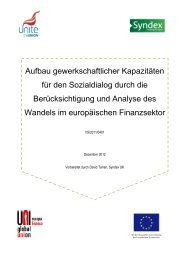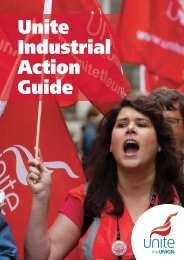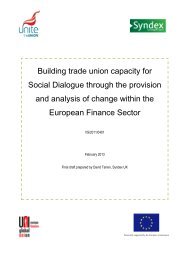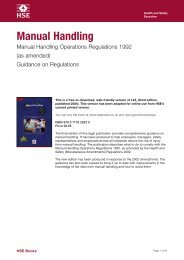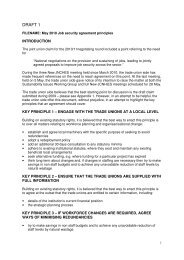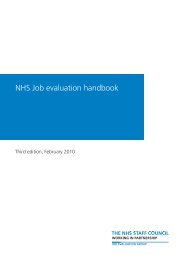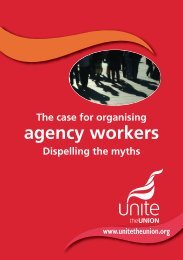Making Companies Safe - what works? (CCA ... - Unite the Union
Making Companies Safe - what works? (CCA ... - Unite the Union
Making Companies Safe - what works? (CCA ... - Unite the Union
You also want an ePaper? Increase the reach of your titles
YUMPU automatically turns print PDFs into web optimized ePapers that Google loves.
five times greater than if one had simply written a notice. And that’s <strong>the</strong> simplest<br />
circumstances. In o<strong>the</strong>r circumstances, <strong>the</strong> factor rises to 20-plus times. So <strong>the</strong>re is<br />
a very big resource constraint on people doing prosecutions.” 15<br />
However, it is important to note that in England and Wales, <strong>the</strong> HSE receives most of its costs<br />
back from those who are convicted (which in 2002/3 was 88% 16 ). In 2003/4 <strong>the</strong> HSE received<br />
back 4.017m. 17 This means that on average <strong>the</strong> HSE receives over £4,910 in costs per case<br />
prosecuted (including those where <strong>the</strong>re were no convictions). This sum is likely to cover a<br />
significant amount of <strong>the</strong> costs of taking prosecutions.<br />
However, <strong>the</strong> HSE does not get back its total costs and in Scotland, where <strong>the</strong> Crown Office<br />
undertakes <strong>the</strong> prosecution, it does not get back any of its investigation costs. The level of<br />
resources will <strong>the</strong>refore undoubtedly impact upon <strong>the</strong> level of prosecutions taken. In reality<br />
<strong>the</strong>refore <strong>the</strong> prosecution criteria set in <strong>the</strong> Enforcement Policy Statement do not reflect <strong>what</strong><br />
would promote improved health and safety but instead reflect political decisions about HSC’s<br />
budget.<br />
The fact that resource constraints currently – and may increasingly – impact upon prosecution<br />
decisions is particularly worrying in view of <strong>the</strong> fact that survey data from <strong>the</strong> UK suggests<br />
that <strong>the</strong> current low likelihood of prosecution is having a negative impact on compliance with<br />
health and safety, and that an increase in <strong>the</strong> likelihood and severity of prosecution –<br />
especially of key decision-makers such as directors and o<strong>the</strong>r senior officers – would provide<br />
<strong>the</strong> most effective prompt for employers to improve <strong>the</strong>ir OHS performance. 18 For instance,<br />
two thirds of interviewees from amongst a statistically representative sample of UK<br />
businesses thought that an increase in <strong>the</strong> possibility of inspection and prosecution –<br />
especially of individuals – would provide <strong>the</strong> best prompt for employers to improve <strong>the</strong>ir<br />
management of occupational health hazards. 19<br />
Levels of Fines<br />
The research indicates that <strong>the</strong> levels of fines is ano<strong>the</strong>r important factor that determines how<br />
companies will comply with <strong>the</strong> law – <strong>the</strong> higher, <strong>the</strong> more effective. The HSE has recently<br />
reported that <strong>the</strong> average level of fine per case fell by 20% from £11,141 to £8,828 between<br />
20001/2 and 2002/3. 20 It also reported that:<br />
• The average level of fine per offence fell by 27% from £8,234 to £6,040<br />
• The average level of fine per offence sentenced in <strong>the</strong> Crown Court fell from £26,961<br />
to £17,632<br />
• The average level of fine per offence sentenced in <strong>the</strong> magistrate Court was almost<br />
unchanged falling from £3,769 to £3,760<br />
• The average level of fine relating to a case following a fatality decreased from £38,055<br />
to £29,564<br />
HSE research also shows that fines imposed on large companies following conviction for<br />
health and safety offences are “up to ten times lower” than <strong>the</strong> general level of ‘civil’ fines<br />
imposed by <strong>the</strong> Financial Services Authority (FSA). This is even when <strong>the</strong> fines follow<br />
workplace fatalities and companies with previous convictions. 20<br />
It is interesting to note that whilst <strong>the</strong> HSE have indicated a lot of concern about <strong>the</strong> level of<br />
fines – which are primarily a factor that is out of <strong>the</strong>ir control – <strong>the</strong>y are at <strong>the</strong> same time<br />
willing to reduce <strong>the</strong> number of investigations that would allow for identification of more<br />
conduct that results in prosecutions, and subsequently fines.<br />
That aside, <strong>the</strong> HSC are right to be concerned since it is important that sentencing must have<br />
a more deterrent effect in order to maximise <strong>the</strong> impact of prosecutions.<br />
The HSC has supported a change in <strong>the</strong> law that would raise <strong>the</strong> maximum fines available to<br />
magistrates courts and would allow courts to sentence individuals to imprisonment for most<br />
offences. And although a private members Bill has come to Parliament three times, each time<br />
it has failed because <strong>the</strong> Government has refused to give it parliamentary time. 51







